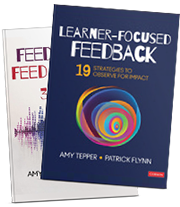What answer do you think you will get when you ask the average teacher which they would prefer:
Have an evaluator observe and tell them what they did during the lesson?
OR
Have an evaluator help them understand how what they did during the lesson represented strengths in helping students learn, and to point out areas of future development that will allow students to grow even more?
There is no N/A, other, or leaving the question blank. What I will not accept as an answer to my question is that the average teacher wants neither of those things. In fact, studies (Megan Tschannen-Moran, 2002 & 2014) find that teachers, especially early career professionals want feedback. Furthermore research into the principles of performance improvement (Stone and Heen, 2014; Killion, 2015; MET, 2015) demonstrate the impact quality feedback can have on performance.
The answer is pretty obvious. Teachers want quality feedback about their practice. In order for them to trust this system, however, educators want to know the person providing that feedback is capable.
In their study, Can principals promote teacher development as evaluators? Matthew Kraft of Brown University and Allison Gilmore of Vanderbilt University revealed that the quality of feedback teachers receive through the evaluation process depends critically on the time and training evaluators receive.
It is a time for schools, districts and states to seriously consider how they are training their evaluators.
Increasing Evaluator Capacity
For the past four years, ReVision Learning has worked with districts in four different states. Without hesitation, I can say that the most important element in considering the effectiveness of an evaluation model is not whether or not a teacher does or does not willingly accept feedback. Instead, it is the capacity of the evaluator to collect, analyze, and deliver that feedback that makes the difference.
So, how do we answer the call for professional learning with evaluators?
As Revision Learning works with districts we use our Cycle of Planning and Performance Improvement to help guide the development of educators in their delivery of service. That cycle supports meta thinking and micro implementation required to shift the mindset of educators about evaluation while simultaneously shifting the programming that maintains that mindset. This applies directly to the development of evaluators.
Strategic Planning
When districts set to strategic planning (Step One of Cycle) that focuses on goals, measures, and practice to address learning throughout their educational community, whether that be for students, teachers, administrators or the organization as a whole, evaluators need to be at the forefront of thinking and planning. First and foremost, and most simply stated, the role of an evaluator is typically held by school leaders and the blending of instructional supervision and evaluation needs to guide our progress towards the strategic goals we establish.
Crosswalk the Performance Standards
This also provides an opportunity to ensure that the performance standards that guide the work of evaluators are aligned and addressing the highest leverage leadership strategies and skills (Step Two of Cycle). In doing so, we ensure that evaluation and instructional leadership practice are viewed as the core leadership responsibility and are inextricably connected. Districts connect their standards of performance to what we know is the most important aspect of leadership within schools, supporting improved classroom practice for student learning. As a shared understanding of leadership practice is established within a district, we can set the stage for evaluators to do their job more effectively through targeted support. ReVision Learning’s Supervisory Continuum has been aligned to national and state standards and used by over 800 evaluators in helping to support this type of professional learning.
Aligned and Supportive Professional Learning
This support needs to come in the form of professional learning designs (Step Three of Cycle) for evaluators that focus on key skill development aligned with research and literature on instructional leadership. Current professional learning designs that measure or claim to improve accuracy in observation are not enough. For evaluators to effectively provide meaningful feedback to support improvements in teacher practice, feedback must become the focus. Evaluators need professional learning that targets their ability to observe teacher practice in relationship to student learning, review various applications of teacher practice, and develop written and verbal feedback skills that support teacher growth, not simply identify teacher action on a four point scale. The MET Project Program Guide released in August of 2015 comes closest to capturing the type of skills that need to be developed through quality professional learning for evaluators. Learning Forward has designed Professional Learning Standards that can be used to support an understanding of what constitutes quality professional learning programming. ReVision Learning’s Collegial Calibration model has a proven record in CT for moving evaluator practice beyond accuracy in observations towards feedback for growth. District and state decision makers need to take a careful look at these three approaches to supporting evaluators as they plan to provide professional learning programs in support of evaluator development.
Routine Feedback on Performance
Finally, feedback is not “one-way”. Evaluators need on-going feedback (Step Four in the Cycle) to improve their practice as much as the teachers they serve. They are learners as much as the teachers and students they serve. Ensuring that evaluators have the targeted, on-going feedback they deserve to become the learning-leader they desire to be is essential. Greg McVerry, Co-Founder of ReVIEW Talent notes that roles of school administrators must evolve. In his post he highlights how the ReVIEW Talent Feedback System is strategically designed to allow for feedback to become a consistent, integral part of a school’s culture, ensuring the evaluators and teachers alike are provided the feedback necessary to learn as a result of their current evaluation system.
Concentrating now in the creation of evaluation systems that value feedback for growth over inspection of practice is paramount. It is the next evolution in educator evaluation.




According to some, the system, which ranks teachers in four categories from below standard to exemplary, has left educators worried about the complexity of the process, uncertain about its accuracy, and buried in paperwork.